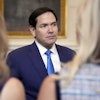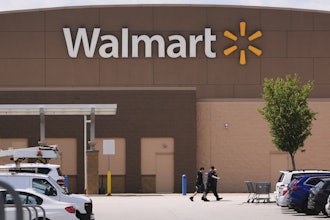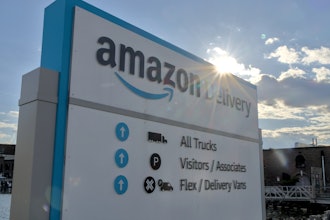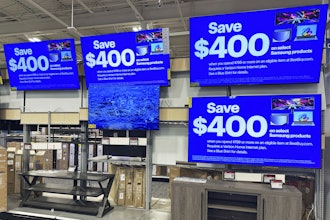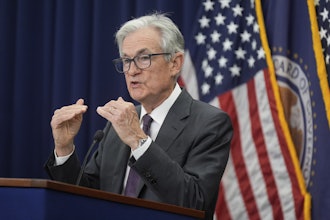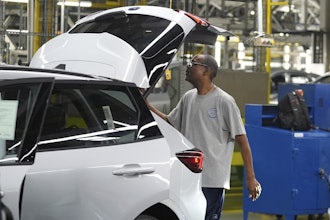
WASHINGTON (AP) — U.S. shoppers stepped up their spending a just bit in February after a sharp pullback the previous month, signaling that Americans are shopping more cautiously as concerns about the direction of the economy mount.
Retail sales rose just 0.2% in February, a small rebound after a sharp drop of 1.2% in January, the Commerce Department said Monday. Sales rose at grocery stores, home and garden stores, and online retailers. Sales fell at auto dealers, restaurants, and electronics stores.
The small increase suggests Americans may be growing more wary about spending as the stock market has plunged and President Donald Trump's tariff threats and government spending cuts have led to widespread uncertainty among consumers and businesses.
Some economists were relieved the numbers weren’t worse. Still, many expect consumer spending will grow just 1% to 1.5% at an annual rate in the first three months of this year, far below the 4.2% gain in the final quarter last year.
“Consumer spending is on track to slow sharply this quarter, but not by as much as we previously feared,” Stephen Brown, an economist at Capital Economics, a consulting firm, said in an email.
On Friday, a measure of consumer sentiment fell sharply for the third straight month and is now down more than 20% since December. Respondents to the University of Michigan's survey cited policy uncertainty as a leading reason for the gloomier outlook. While the respondents were divided sharply by party — sentiment about the current economy fell among Republican by much less than for Democrats — Republicans' confidence in the economy's future dropped 10%.
Consumers from all income levels are feeling more strained, according to a slew of earnings reports over the past few weeks from major retailers including Walmart, Macy’s and Dollar General.
Walmart, the nation’s largest retailer and a bellwether for the retail sector, released a weak outlook last month citing uncertainty around tariffs.
February sales also fell last month at gas stations, clothing stores, and sporting goods stores. The figures aren't adjusted for prices, and the cost of gas also declined in February, which likely accounts for most of the drop. Excluding gas and autos, retail sales rose 0.5%, a healthier figure but still modest after a plunge of 0.8% in January.
Macy’s, which caters to a diverse group of shoppers at its stores and the more upscale Bluemercury cosmetics chain and at Bloomingdale’s, said customers of all income levels are feeling angst. The company’s outlook this month was weaker than expected on Wall Street.
“I think the affluent customer that’s shopping Macy’s is just as uncertain and as confused and concerned by what’s transpiring,” Macy’s CEO Tony Spring said last week. “So, our outlook tries to take into account the pieces that we know and the things that we don’t know.”
Hiring has mostly held up and there are no signs that companies are laying off workers. As long as Americans have jobs, spending will likely show signs of resilience.
Dollar General CEO Todd Vasos told industry analysts on Thursday that he doesn’t expect any improvement in the macro-environment, particularly for the chain's core customers.
“Our customers continue to report that their financial situation has worsened over the last year as they have been negatively impacted by ongoing inflation ” Vasos said during an earnings call. “Many of our customers report that they only have enough money for basic essentials, with some noting that they have had to sacrifice even on the necessities.”
Costco noted changing that spending pattens have changed for customers amid the uncertainty, including a shift toward ground beef and poultry, rather than more expensive cuts of meat, according to Gary Millership, the company’s chief financial officer.
American Eagle Outfitters said last week that sales for the early part of the current quarter have been negatively affected by a “less robust consumer environment” and cold weather. Like other retailers, it expects its annual revenue to be down this year.
CEO Jay Schottenstein said angst is particularly high among younger customers.
“They have the fear of the unknown,” Schottenstein said. “Not just tariffs, not just inflation. We see the government cutting people off. They don’t know how that’s going to affect them. And when people don’t know what they don’t know – they get very conservative.”
The retail sales report mostly just covers goods purchases — as well as restaurant sales — but there are signs Americans are cutting back spending on services as well.
Airline executives at last week’s airline industry conference sponsored by JP Morgan noted a slowdown in bookings. In addition to some pullback after a series of air traffic incidents, they said customers are pulling back on spending.
“There was something going on with economic sentiment, something going on with consumer confidence," said Delta CEO Ed Bastian at the industry conference.
